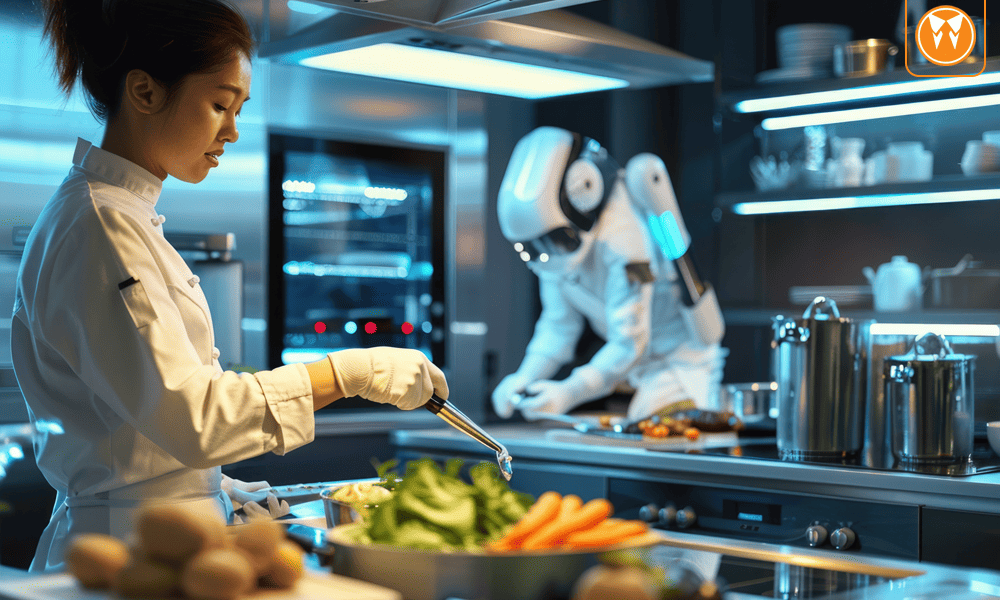The food and beverage industry is undergoing a revolutionary change, partly driven by Artificial Intelligence (AI). As the sector adapts to changing customer needs and supply chain constraints, artificial intelligence (AI) is playing an important role in driving innovation and increasing development potential.
From tailored customer experiences to efficient manufacturing processes, the incorporation of AI technology is transforming the future of food and beverages in remarkable ways.
1. Personalization of Customer Experiences through AI
AI is significantly enhancing the personalization of customer interactions within the food and beverage sector. By analyzing vast amounts of data, AI algorithms can predict consumer preferences, suggest tailored menus, and improve overall customer service. For example, AI-powered chatbots and recommendation engines help restaurants and food delivery services offer personalized suggestions based on previous orders or customer behavior patterns. This level of personalized attention not only increases customer satisfaction but also drives repeat business and customer loyalty.
In addition, AI is being utilized to create customized food experiences that cater to dietary restrictions or preferences. Whether it’s crafting a menu for a vegan or gluten-free customer or offering meal plans based on nutritional needs, AI technology is making these services more accessible and efficient, ultimately improving customer engagement.
2. Optimizing Supply Chain Management with AI
Supply chain management is an essential aspect of the food and beverage industry, and AI is revolutionizing this area by enhancing efficiency and reducing waste. With AI, food manufacturers can predict demand more accurately, which helps them manage inventory levels effectively. By utilizing predictive analytics, AI systems can analyze past sales data, weather patterns, and market trends to forecast demand and adjust production accordingly. This leads to less food wastage and ensures that products are available when and where they are needed.
Moreover, AI-powered tools help food companies optimize their sourcing strategies by identifying cost-effective suppliers, monitoring food quality, and ensuring timely deliveries. These advancements not only reduce operational costs but also streamline the entire supply chain, contributing to faster production cycles and higher profit margins.
3. Improving Food Quality and Safety through AI
Food safety is paramount, and AI is making significant strides in ensuring the safety and quality of food products. AI technologies such as machine learning and computer vision are being employed to monitor food quality during production processes. Through image recognition, AI can detect contamination or imperfections in food items on the production line. This allows manufacturers to catch potential issues before they reach consumers, reducing the risk of foodborne illnesses and enhancing the overall quality of the products.
AI is also being used in predictive maintenance for equipment used in food production. By monitoring machinery performance, AI can predict when a machine is likely to fail, allowing companies to perform timely maintenance and avoid costly disruptions. This not only improves the safety of food production but also reduces downtime and extends the lifespan of production equipment.
4. Driving Sustainability in Food Production with AI
Sustainability is a key concern in the food and beverage industry, and AI is proving to be a valuable tool in addressing environmental challenges. AI is helping companies reduce energy consumption, minimize waste, and optimize resource usage in food production. By analyzing data from various sources, AI can recommend more sustainable practices, such as improving energy efficiency in factories or reducing water usage during the production process.
Additionally, AI is being used to develop more sustainable packaging solutions, which are crucial in reducing the environmental impact of food products. Machine learning models are helping companies create biodegradable or recyclable packaging options that are both cost-effective and eco-friendly.
In The Corporate Business view, AI is driving significant growth and innovation across the food and beverage sector. By enhancing personalization, optimizing supply chains, improving food quality and safety, and promoting sustainability, AI is reshaping the industry’s future. As technology continues to evolve, it will likely play an even more crucial role in shaping the future of food production and consumption.

